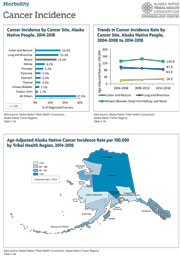
Alaska Native Tumor Registry
What is the Alaska Native Tumor Registry?
The Alaska Native Tumor Registry (ANTR) is a collection of cancer information going back to 1969 on all Alaska Native and American Indian individuals living in Alaska at the time of their diagnosis. The mission of the ANTR is to contribute to the wellness of Alaska Native people by collecting, analyzing, and disseminating cancer information.
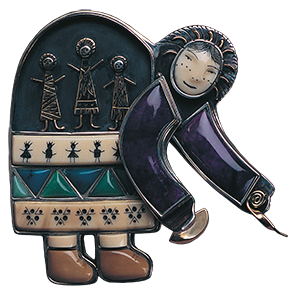
What is a Cancer Registry?
A cancer registry is a collection of information on cancer diagnosis, characteristics, treatment, and outcomes. The ANTR collects information on all Alaska Native and American Indian people living in the state of Alaska who have cancer.
Registries such as ANTR are permitted to collect this information without patient authorization because the they are considered public health entities under the Health Insurance Portability and Accountability Act of 1996 (HIPAA).
Cancer Data
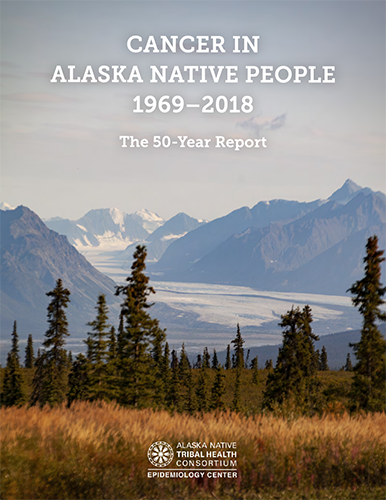
Cancer in Alaska Native People 1969-2018
This 50-year report shows detailed information on cancer incidence and mortality by site, gender and region. It also gives cancer trends over time compared to U.S. whites.
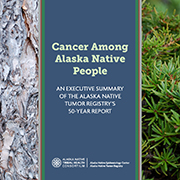
Cancer Among Alaska Native People: Executive Summary of the 50 Year Report
This brochure summarizes the information from the full 50 year report. It gives information on the leading cancers, how rates of these cancers vary throughout the state, and how they have changed over time.
ANTR Cancer Surveillance
The ANTR works with partners in tribal and non-tribal health facilities across Alaska to collect cancer information including the Alaska Native Medical Center (ANMC) and other hospitals throughout the state. We also collect data from tribal health care facilities, as well as non-tribal hospitals. We also have a strong relationship with the Alaska Cancer Registry (ACR), which is managed by the State of Alaska’s Department of Health and Social Services. The ACR collects cancer information on individuals of all races throughout Alaska. Finally, because some patients are transferred to Seattle for treatment, we also work with the Washington State Cancer Registry to capture relevant information.
The type of data that we collect includes the cancer site (location on the body), the stage at diagnosis, the cell type of the cancer, and treatment. We also gather specific information about the patient including age at diagnosis, gender, race, residence at diagnosis, place of birth, tribal affiliation, as well as other characteristics such as BMI and smoking history. We also follow all cancer patients for vital status and cause of death. In total, more than 100 different pieces of information about each person are contained in the ANTR database.
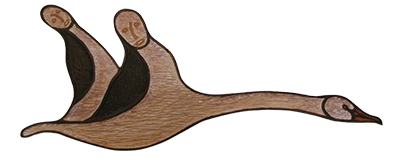
We are committed to patient and community privacy and confidentiality. All information reported to the ANTR is confidential, and strict procedures are in place to protect privacy. All employees are trained in handling confidential information. All projects that use the data are reviewed by the ANTR Director, as well as by the Alaska Area Institutional Review Board, tribal health organizations, and the ANTHC Privacy Office, as appropriate. No community-level data are released publicly, and case counts less than five are not reported in publications.
ANTR Data Use and Dissemination
It is not enough just to collect cancer information. Surveillance data are of limited value unless they are used. We use these data for many purposes including: describing the population burden of cancer, including trends over time; comparing the burden of cancer among Alaska Native people with other US populations; serving as a resource for health planners, medical professionals, researchers and others concerned about cancer; initiating cancer control programs and evaluating intervention activities; and conducting other epidemiological research. The ANTR is committed to using the information that we collect to understand and address the burden of cancer among Alaska Native people in a meaningful and responsible way.
Data from ANTR have been used to:
- Demonstrate the need for Alaska Native people to begin screening for colorectal cancer at age 40 years, rather than the national recommendation to begin at age 50 years.
- Show that nasopharyngeal cancer, which is a particularly rare cancer across much of the world, is more common among Alaska Native people.
- Demonstrate how cervical cancer screening programs decreased rates of cervical cancer over time.
One of the main ways that we share the data is through reports. Every five years, we produce a report on cancer incidence among Alaska Native people. Our Executive Summary of that report is also available.
We are also committed to making cancer information available to our partners across Alaska, and nationwide. If you have specific questions that these data might be able to answer, please contact us. ANTR staff are also available to give presentations on cancer among Alaska Native people. Please contact us for further information.
Studies of Cancer Among Alaska Native People
Current studies
The ANTR has several ongoing studies of cancer among Alaska Native people:
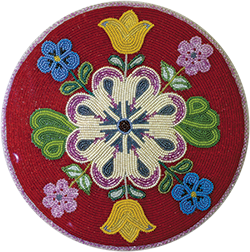
- Case-control study of colorectal cancer risk: This study is a collaboration between ANTHC in Anchorage and the Fred Hutchinson Cancer Research Center in Seattle. This study will try to understand why Alaska Native people have one of the highest rates of colorectal cancer in the world. This study evaluates lifestyle and genetic risk factors for colorectal cancer. Our goal is to identify concrete targets for cancer prevention programs. This study is funded by the NIH American Indian Alaska Native Translational Research Center, through a grant from the National Institute of General Medical Sciences (Award Number U54GM115371).
- Natural history of nasopharyngeal cancer (NPC): Rates of NPC are over 17 times higher among Alaska Native people than they are among US whites. High rates are also observed across the circumpolar north, as well as in Asia. We do not know much about this cancer among Alaska Native people. This study will answer the following questions: Who is diagnosed with NPC, and what does this disease look like among Alaska Native people? How is NPC treated, and what are the treatment outcomes? The goal of this study is to identify characteristics of NPC tumors and NPC patients that may be predictive of better responses to therapy. This study is funded by the NIH American Indian Alaska Native Translational Research Center, through a grant from the National Institute of General Medical Sciences (Award Number U54GM115371).
Completed studies
Since 1969, ANTR staff and others have published results from over 115 studies that used the registry data. Some of our most recent studies include:
- Cancer survival: Data from the registry was used to describe survival for breast, colorectal, lung, prostate, and kidney cancers. We found that, over the past two decades, survival has increased for lung and colorectal cancers, but that it is still lower than that observed among U.S. whites.
- HPV among Alaska Native cervical cancer specimens: Information from the registry was used to identify cervical cancer patients that had tumor specimens stored. ANTR staff, along with collaborators from the CDC’s Arctic Investigations Program, tested the specimens for HPV, a virus known to be related to cancer. We found that HPV strains were very similar among Alaska Native women and U.S. white women. This is important because it suggests that the HPV va (PDF to come from Sarah).
- Understanding Alaska Native people’s perspectives on biospecimen banking for cancer research: This study examined Alaska Native people’s attitudes towards biospecimen banking and genetic research. It showed that Alaska Native people are generally open to the idea of such research provided that it is conducted in a transparent, culturally-respectful manner.
- Cancer disparities among Alaska Native people: This study looked at how the cancer burden differs between Alaska Native people and U.S. whites. Some cancers are more common among Alaska Native people, including colorectal, lung, liver, stomach, nasopharyngeal, and kidney cancers. In contrast, some cancers, including prostate cancer and melanoma, are less common.
Our History
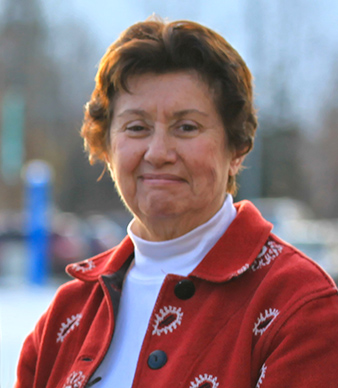
The ANTR was founded in 1974 by Dr. Anne Lanier, in collaboration with colleagues from the National Cancer Institute, and the Centers for Disease Control and Prevention (CDC). Dr. Lanier and her colleagues noticed that Alaska Native people seemed to experience more of certain cancers than expected. They established the registry to understand the burden of cancer among Alaska Native people.
Since 1999, the ANTR has been a full member of the National Cancer Institute’s Surveillance, Epidemiology and End Results (SEER) program. Funding from the SEER program has allowed ANTR to continue its mission to collect high quality cancer data to understand and address the burden of cancer among Alaska Native people.
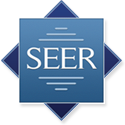
The ANTR has been collecting cancer data since 1974, with data from 1969 forward. This long history of cancer surveillance is a rich resource for understanding cancer among Alaska Native people.
The Surveillance Epidemiology and End Results (SEER) Program
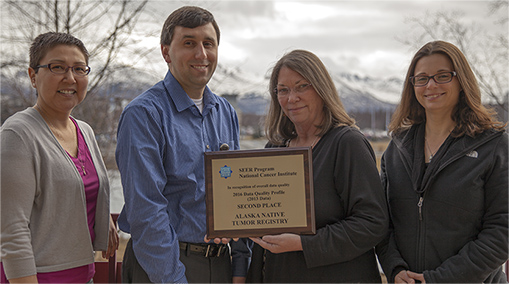
The SEER Program was established nationally in 1971 to collect, analyze, and disseminate data useful in the prevention, diagnosis, and treatment of cancer. The SEER Program collects cancer data on a routine basis from designated cancer registries across the U.S. Initially, nine registries were part of the SEER program. Today, there are twenty registries that report data to SEER. The SEER registries are considered to be among the most accurate and complete cancer registries in the world, and the SEER program is constantly looking for ways not only to ensure collection of high quality data, but also the right data to answer questions about cancer burden and control. This is particularly important as cancer care improves and our understanding of these diseases evolves.
Resources
Community Outreach and Education
An important part of our mission is to return the data that we collect to Alaska Native communities. ANTR staff are available to answer your cancer questions to the best of our ability. We can also give in-person or videoconference presentations on cancer among Alaska Native people for your region, as well as on cancer prevention and control topics. Please contact us at antr@anthc.org for further information.
Questions or Comments?
We welcome your feedback.
Interested in engaging in cancer research with the ANTR? Please contact us! We are interested in collaborating on studies to understand and address the burden of cancer among Alaska Native people.
Email: antr@anthc.org
Phone: (907) 729-4567

